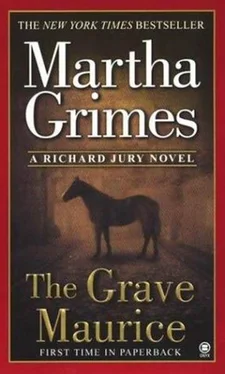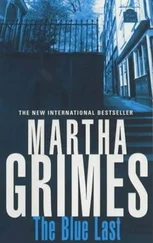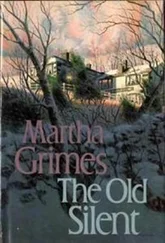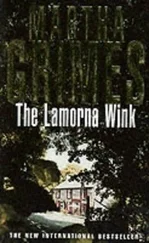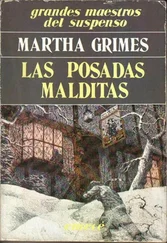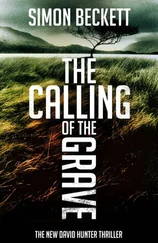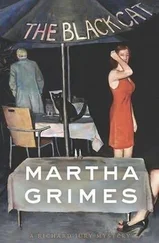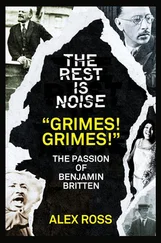
Martha Grimes
The Grave Maurice
Book 18 in the Richard Jury series, 2002
To little Will Holland,
nearly a year,
and his grandparents,
Virginia and Scott
He told where all the running water goes,
And dressed me gently in my little clothes.
– Robert Pack, “The Boat”
Do memories plague their ears like flies?
They shake their heads. Dusk brims the shadows.
Summer by summer all stole away,
The starting gates, the crowds and cries-
All but the unmolesting meadows,
Almanacked, their names live; they
Have slipped their names, and stand at ease,
Or gallop for what must be joy,
And not a fieldglass sees them home,
Or curious stop-watch prophesies:
Only the groom, and the groom’s boy,
With bridles in the evening come.
– PHILIP LARKIN, “AT GRASS”
In the distance, the horse looked white, but nearer, one could see the white was muted, more the color of a winter dawn, a shadowy white, like blue snow. It was barely dawn, the boy’s favorite time of day. He loved all of the horses in the stable but this horse in particular.
The pale horse watched the boy coming toward him, bridle and saddle over his arm, walking through the mist. Not him. What had happened to that jockey who could really ride him? Where were the ribbons, the roses, the shouts and the cheers? Or that girl, for that matter, who handled him better than the boy, her fingers curled on the reins like chrysanthemum petals. If there was one thing the horse knew it was hands-the boy’s the trainer’s the jockey’s the girl’s. She must be a filly in disguise; she couldn’t be a human girl. For some reason.
The boy came up to him, patted and smoothed his neck, and handed over a couple of lumps of sugar. Then he threw the plaid blanket over him and they both walked off on the path through the trees, across the pasture, toward the track. The boy still carried the saddle, not wanting to mount until they’d reached the track, which lay at the bottom of a low-rising hill. This early-morning gallop around the stud farm’s training track was the high point of their day.
Your day.
The boy and the horse were only a couple of years apart-fourteen and sixteen-but the horse (the boy knew) was infinitely more talented, even though its racing days were past. Though he knew it wouldn’t happen, the boy hoped the horse would outlive him. The horse had outlived his father, who had been killed during a race, thrown from another horse. When he thought about his father, the boy found it hard to picture him in anything except his blue and gold silks. His father had been famous. But this horse, Samarkand, was fabled.
The boy, whose name was Maurice, often wondered if Samarkand missed the race, the hectic thrash of hooves, the cries and cheers of a summer afternoon, the excitement of the winner’s circle.
He remembered vividly a day when he was small, his dad up on Samarkand, winning the Gold Cup at Ascot. He saw himself and his little cousin Nell jumping up and down for joy like two corks popped from champagne bottles. The year before it had been Newmarket and the first time that Samarkand had astonished them all. In the back stretch the horse had opened up. Already running hard, Samarkand ran harder, leaving the entire field seven furlongs behind in his smoke.
His father’s surprise at this totally unexpected show had wiped his face clean of expression, even when they all got into the winner’s circle. The stud farm’s owner-Maurice’s grandfather-could find nothing to say. The trainer was the only one who seemed to take it in stride, as if he expected nothing less of Samarkand, but took no credit for himself when people slapped him on the back and said Brilliant, brilliant. People reached up to grab the jockey’s hand as wreaths of flowers descended on horse and jockey as if they’d fallen from the sky.
The one in the circle who was least vainglorious and most dignified was Samarkand himself.
Samarkand wasn’t just a horse; he was one of the greatest horses in horse history, was mentioned in the same breath as Red Rum or that American horse known for being a weight carrier, for winning no matter how much they piled it on-Forego. Forget it.
Samarkand had run every high-stakes race there was, won nearly every significant purse. Not just in his own country, but in America, Churchill Downs, New York, the Derby, the Belmont and the beautiful Hialeah Park.
Maurice often wondered about Thoroughbreds. Did things get imprinted on their minds? Events, races, the winner’s circle? This was not to wonder if Samarkand simply remembered the day-to-day rounds, but were important things printed, branded on his mind? Images of happiness, images of hay? Memories of Newcastle or New York, Doncaster, Cheltenham, Hialeah, the colors, the silks, the roses?
… the pink wading birds, the brilliant suns and colors rushing toward him, partly hidden from his blinkered eye, a whole vista of colors and faces, cheers and shouting. Forced to the rail (he hated that), he waited for an opening and when it came, he blew straight through it.
Freedom. Nothing ahead nothing beside. Even the cheers faded before they reached his ears.
Right now, they were doing a five-furlong breeze and Maurice knew Samarkand could do it in little over a minute; he’d done it before.
When they were coming out of the back stretch, Maurice noticed a figure with binoculars standing on the hill. It wouldn’t be their trainer; he didn’t come this early. It must be Roger. His uncle, Roger, sometimes came here to watch before he left for the hospital in London.
Not Roger. Wrong hands.
Samarkand did not appear to feel the loss of his old agility, his old gait, nor the loss of the nimble orchestration of his jockey’s hands and legs. The horse seemed as willing, if he’d been given rein, to pull out all the stops for this sixteen-year-old, too-tall lad as for the boy’s father. They galloped round the track at no record-breaking speed. It didn’t matter.
In memory, they flew.
Twenty months later
Melrose Plant looked around the rather grim environs of the Grave Maurice and wondered if it was patronized by the staff of the Royal London Hospital across the street. Apparently it did serve as some sort of stopping-off point for them, for Melrose recognized one of the doctors standing at the farther end of the long bar.
As Melrose stood there inside the door, the doctor emptied his half-pint, gathered up his coat and turned to leave. He passed Melrose on his way out of the pub and gave him a distracted nod and a vague smile, as if he were trying to place him.
Melrose stepped up to the place the doctor had left, filling the vacuum. He was looking at the woman close by, one of surpassing beauty-glossy, dark hair, high cheek-bones, eyes whose color he couldn’t see without staring but which were large and widely spaced. She was talking to another woman, hair a darkish blond, whose back was turned to Melrose and who drank a pale drink, probably a Chardonnay, whose ubiquity, together with the wine bars that loved to serve it up, Melrose couldn’t understand. The dark-haired one was drinking stout. Good for her. The bartender, a bearded Indian, posed an indecipherable query that Melrose could only suppose was a variant of “What will it be, mate?” The operative term was either “grog” or “dog,” as in “Want a bit o’ grog?” or “Walkin’ yer dog?” Having no dog, Melrose ordered an Old Peculier.
Читать дальше
